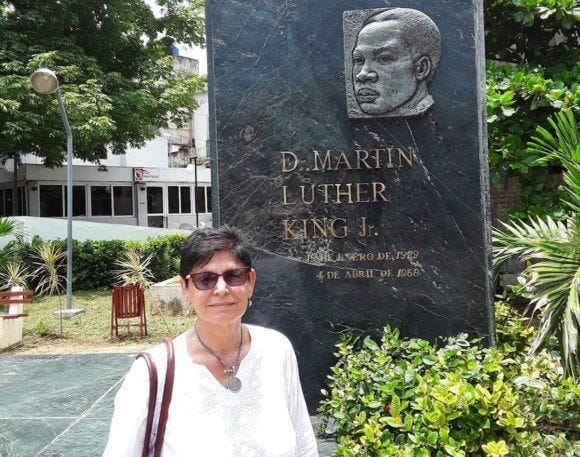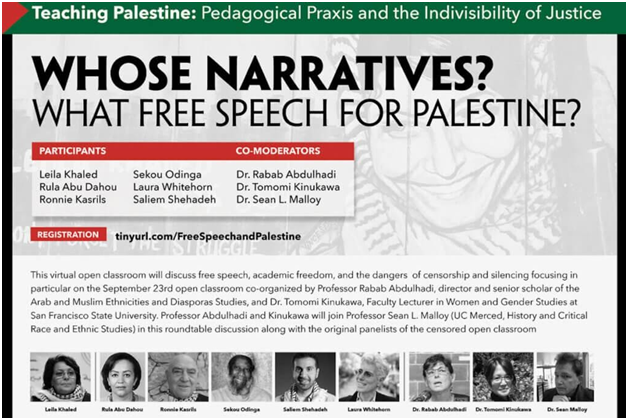
Pushed by repressive governments, Big Tech and the Israel lobby are suppressing freedom of speech and academic freedom. As often happens, attacks on Palestinian rights are the sharp edge of the wedge undermining everyone’s rights. Palestinian academics and supporters are fighting this censorship and asking for your help.
The Israel-identified community, with its legal arms such as The Lawfare Project, political arms like the American Israeli Public Affairs Committee (AIPAC,) and dozens of others, have suppressed pro-Palestinian voices for years. Now, in the era of online learning, hot war in Israel/Palestine, and COVID shutdowns, they are moving to de-platform Palestine completely.
“From posts incorrectly flagged by Facebook as incitement to violence,” wrote Jillian C. York and David Greene of the Electronic Frontier Foundation, “to financial censorship of relief payments made on Venmo, and the removal of Instagram Stories (which also heavily affected activists in Colombia, Canada, and Brazil), Palestinians are experiencing an unprecedented level of censorship [Read this article later! – DS] during a time where digital communications are absolutely critical.”
Ameer Al-Khatahtbeh, who runs a magazine for millennials called Muslim, says he has documented 12,000 acts of censorship on Instagram alone in the past several weeks. The censorship is especially heavy on campuses.
In September 2020, the Arab and Muslim Ethnicities and Diasporas (AMED) program at San Francisco State University (SFSU) planned an online classroom called “Whose Narratives? Gender, Justice, and Resistance,” to be hosted on Zoom. The program, including speakers and audience from three continents, was organized by AMED professor Dr. Rabab Abdulhadi and Women’s and Gender Studies professor Dr. Tomomi Kinukawa. One of the featured speakers was to be Leila Khaled of the Popular Front for the Liberation of Palestine (PFLP).

The inclusion of Khaled, who hijacked two planes in 1969–70 to fight against Israel’s takeover of Palestine, drove the Israel Lobby into a state of fury. As documented on the Mondoweiss web site, “The event was protested by a number of right-wing, pro-Israel groups. The Act.IL app, largely funded by the Israeli government, drove hundreds, perhaps thousands of users to write and call the California State University directors, warning them of consequences for supporting “terrorists” such as Khaled.
Zoom canceled the program, a for-credit college class, without the school’s public consent (though Dr. Abdulhadi thinks they may have agreed privately.) The organizers moved the program to Facebook where it was also blocked, then to YouTube, only to have the same kind of pressure from Israel-identified opponents shut down the live feed 20 minutes after it started.
In April 2021, Drs. Abdulhadi and Kinukawa sponsored another Whose Narratives, inviting Khaled, now 77 years old. Once more, Israel’s advocates got Zoom to cancel the program, but this time they went further. They convinced Facebook to shut down AMED’s page, making it more difficult for AMED faculty to communicate with the public or even with their own students. They have also pressured SFSU administration to cut back AMED classes. As of now, two AMED summer courses are on hold because of lack of access to a platform.

Under criticism for blocking academic freedom, Zoom in April 2021 trumpeted a new approach to online instruction, transferring decision-making power to universities. But it reserved exceptions for cases where “Zoom determines that there is legal or regulatory risk to Zoom if it does not act.” The Israel Lobby’s attacks on Khaled repeatedly called her a terrorist, a label which conceivably could lead to legal problems for anyone giving her a platform, though such problems have never materialized in practice.
Despite widespread condemnation from academic groups including the journal Academe, the California Faculty Association, the Professional Staff Congress of the City University of New York (PSC-CUNY,) and others, Zoom refused to reverse its censorship decision. In response, UCLA English professor Saree Makdisi tweeted, “This is what happens when we subcontract our universities to Zoom: they decide which events are acceptable and which aren’t. It’s outrageous.”
Censoring Palestine on Facebook
After Zoom deplatformed the April panel with Khaled, Facebook shut down the AMED program’s FB page without prior notice, taking down years’ worth of documents. They have so far refused to reinstate the page.
Tech giants, especially Facebook, seem heavily influenced by Israel and its Lobby. In May 2020, Facebook hired Emi Palmor, former Director General of the Ministry of Justice of the State of Israel, as a member of their Oversight Board, a committee that makes content moderation decisions on Facebook.
According to the Association for Progressive Communication, “During Palmor’s time at the Ministry of Justice (2014–2019), the Ministry established the Israeli Cyber Unit, or ‘Internet Referral Unit,’ whose work has deliberately targeted and resulted in the takedowns of tens of thousands of Palestinians’ content, and imposed severe limitations on freedom of expression and opinion, especially about Palestine.” According to the 7amleh Arab Center for Social Media Advancement, Facebook complied with 81 percent of Israel’s requests.
Jewish Voice for Peace (JVP,) an organization which co-sponsored the September AMED event and which advocates for Palestinian rights, released a statement and a petition calling on FB to restore the AMED page immediately. They wrote, “ Jewish Voice for Peace chapters across the country planned to live-stream the Whose Narratives event. When the event was canceled without notice, we were informed that these chapter pages were now at risk of being blocked from Facebook.”
JVP Director of Special Projects Tallie Ben-Daniel wrote, “The AMED page provides vital, intersectional programming on the connections between the Palestinian struggle and other liberation movements across the globe. Facebook is depriving students, scholars, organizers and community members of access to irreplaceable material and programming. By erasing the AMED Studies page, Facebook is assuming a vast power that all conscientious users must reject: the power to ban university academic programs from their platform, especially those that center on justice for Palestine.”
Please consider signing and sharing their petition.
Tell Facebook to restore the AMED page immediately!
— — — — — — — — — — — — — — —
Thanks for reading! Follow me on Twitter, on Facebook or Medium.com. Hire me for freelancing, editing, or tutoring on Linked In
